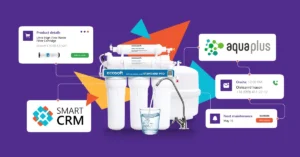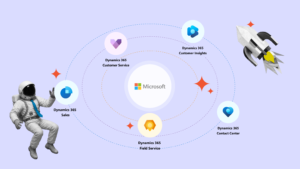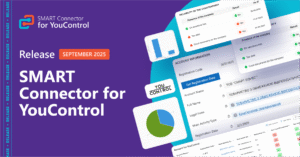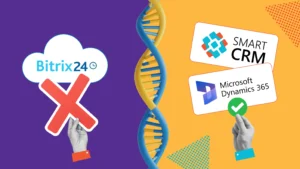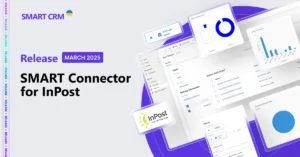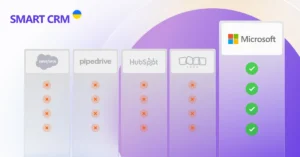From Tradition to Innovation: How CRM Helps Ensure Sustainable Development of Agribusiness
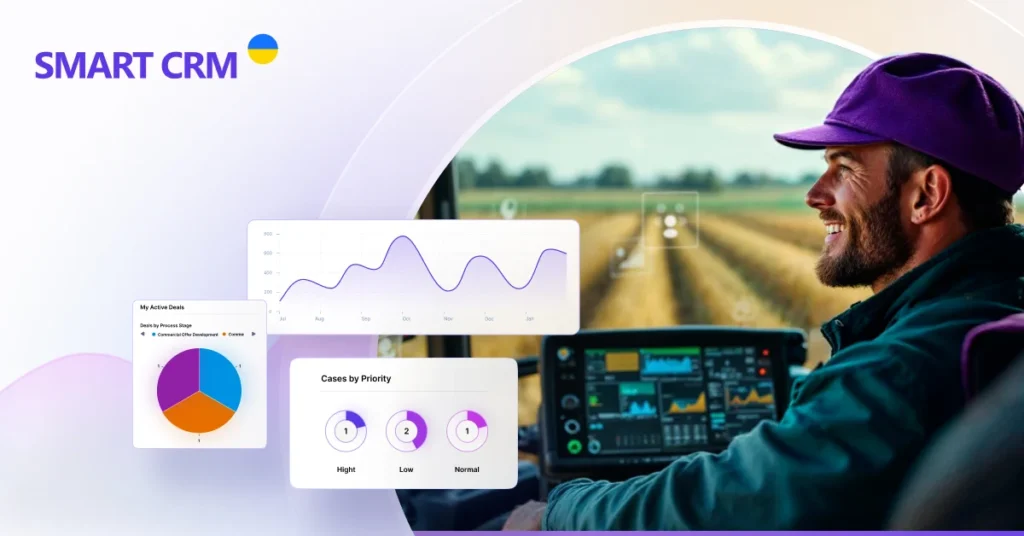
Modern agribusiness has long been about irreversible dependence on natural conditions and absolute uncertainty and unpredictability of profitability. Today, it is a well-managed high-tech industry that combines traditional agricultural production methods with innovative technologies such as production automation, predictive analytics and digital solutions for optimizing business processes.
For example, agribusiness companies are increasingly using drones to monitor fields and sensors to collect data on soils and climate.
And the use of modern IT solutions, in particular, based on artificial intelligence, allows companies to process these huge arrays of data in real time to optimize business processes and improve the accuracy of your own predictive analytics. As a result, the dependence of the level of profitability on climatic conditions decreases and business development is sustainable.
This allows the industry to withstand such serious challenges of our time as global climate change and be a “strong link” in the supply chains of global markets. While some companies, skillfully combining traditions with innovations, manage to maintain their competitiveness for decades.
For example, a well-known manufacturer of biological solutions for soil protection from the Netherlands, Koppert, thanks to serious investments in the modernization of the enterprise, has managed not only to remain competitive in the market for more than half a century, but also to constantly scale up (today it has three dozen offices around the world, and its products are sold in more than a hundred countries).
Soil protection products from Koppert allow farmers from all over the world to maximize their own profits with minimal damage to the environment. And this happens largely since the company has always been determined to “hear” the consumers. Investments in innovative solutions for data analysis allowed it to track the growing demand of society for healthy and natural food without GMOs and pesticides in time and stay on trend.
What to pay attention to when choosing a CRM system for an agricultural enterprise
An integral part of the IT ecosystem of a modern agricultural company is the CRM (Customer Relationship Management) system. Classically, this is specialized software designed to manage relationships with customers, suppliers and partners.
A well-chosen CRM system is not only capable of optimizing a number of processes in sales, marketing and customer service and taking the processing and analysis of data produced by the business to a new level, but also contributing to a significant increase in a number of critical indicators of its activity. In particular, its productivity and efficiency.
Choosing a CRM system is much more than choosing software for the next business upgrade. This is a strategic decision that will determine the development of the company in the near future, and therefore requires significant attention.
When talking about choosing a CRM for an agricultural enterprise, in addition to testing the solution for compliance with the classic functionality, it is important to assess whether it can be customized for special needs caused by the specifics of the industry. In particular, this includes:
- interaction with a wide range of stakeholders: agricultural enterprises work with different groups of clients, suppliers, distributors, including government organizations, cooperatives and various unions and associations. A CRM system for the agricultural sector should provide the ability to consider the specifics of each of these categories for effective management of relations with them and work to improve the efficiency of contract management and logistics processes,
- seasonality of operations: agribusiness is cyclical in nature with pronounced seasonality. A CRM system for enterprises in the industry should provide the ability to take this aspect into account for effective planning of sowing and harvesting campaigns, coordination of deliveries of fertilizers, seeds and equipment, and, ultimately, planning the supply of their own products to clients,
- management of large volumes of data: a significant amount of information is collected in the agricultural sector: from meteorological data to various indicators characterizing soil quality and crop yield. A CRM system should be able to integrate with other programs for collecting and analyzing such data, which allows farmers to make informed decisions and quickly adapt to changes,
- strict quality and food safety control: a CRM system for agricultural enterprises is designed to help track the processes of production, harvesting and storage of crops, which is critical to ensuring the quality of the final product. This also includes the ability to track timely certification and compliance with current safety standards,
- mobility and work in the field: agribusiness often conducts its operations in regions with limited Internet access. Therefore, the optimal CRM system for farmers should provide the ability to work in offline mode to implement continuous access to data. And the presence of mobile apps will facilitate the rapid exchange of information between employees working both in the field and in the office,
- planning and optimization of marketing campaigns in accordance with the specifics of the industry: agricultural companies often operate in markets where direct interaction with clients is important (these can be both end consumers and cooperatives, unions and associations of citizens). Each of these segments requires an individual approach. The CRM system should provide the ability to conduct personalized marketing campaigns and effectively manage customer relationships at all stages of the product life cycle.
Key functionality of CRM for the agricultural sector
The basic functionality of an optimal CRM system for the agricultural sector should provide for the following use cases.
Monitoring and analytics
CRM systems for the agricultural sector can collect, store and analyze large volumes of data coming from various sources: from soil analysis sensors to sales reports or customer reviews.
The corresponding analytical tools help to structure this data and analyze it, providing farmers with up-to-date information on consumer preferences and trends in sales markets. Consequently, they are effective in optimizing offers and marketing strategies and increasing the level of satisfaction of partners and clients and work to build long-term relationships.
Logistics and supply management
CRM systems facilitate supply chain management. In particular, they make it possible to:
- control the delivery of goods: thanks to the integration of CRM with transport management systems, it is possible to track the transportation of certain batches of goods in real time, which is especially important, say, for products with a limited shelf life, as well as for effective communication with clients on the status of their orders,
- automate contract management processes: CRM simplifies the coordination of delivery conditions, invoicing processes and procurement management.
Marketing Campaign Automation
CRM allows agribusinesses to develop and launch personalized marketing campaigns based on customer segmentation and needs analysis. In particular, this includes:
- personalization of offers based on historical data on purchases and customer interactions: the system automatically customizes marketing messages, offering farming enterprises or individual customers relevant items,
- multichannel communication: CRM supports various communication channels: email, SMS, instant messengers. This allows you to “knock on the door” of a potential customer in their usual channel and be heard, thus expanding your outreach and increasing customer engagement,
- automation of the process of stimulating repeat sales and cross-selling: the system can automatically generate special offers or reminders about repeat purchases, say, of fertilizers or equipment in the relevant seasons and offer relevant related products.
Integration with other components of the enterprise IT ecosystem
In modern agribusiness, the CRM system must provide for the possibility of integration with other solutions to ensure comprehensive enterprise management. In practice, this is an opportunity to implement synchronization of business processes for a prompt response to changes in the market situation and various challenges. In particular, we are talking about:
- integration with ERP systems: allows you to synchronize the management of internal processes (production, finance, inventory management) with external operations, such as customer service and order management,
- connection to IoT devices: data from sensors and drones on the state of fields and crops is automatically transferred to the CRM for further analysis and simplification of the process of making management decisions,
- integration with weather forecasts: the CRM can use weather data to adjust plans for field work, help make decisions on resource management and even generate warnings for clients about possible changes in supply schedules,
- connection to TMS systems of agricultural enterprises that independently handle logistics allows for a comprehensive approach to managing customer orders and deliveries. This is an opportunity to track logistics operations in real time and analyze them to reduce the enterprise’s transportation costs due to optimal route planning. And this is also a guarantee of effective communication with clients about the status of deliveries.
Some CRM systems, including those based on Microsoft Dynamics 365, offer ready-made usage scenarios (templates) for various business processes that can be adapted to the specifics of the agricultural sector. This allows you to quickly set up automation of a number of processes in accordance with the needs of a particular enterprise, without starting from scratch.
Benefits of CRM Implementation in the Agricultural Sector
The implementation of a modern CRM system provides agricultural enterprises with full control over most key production and sales processes and increases their efficiency and profitability. This is achieved due to:
Thus, the implementation of a CRM system makes it possible to optimize a number of business processes of an agricultural enterprise and increase crop yields due to more accurate operational forecasting and more efficient management. In turn, increased efficiency and reduced operating costs lead to an increase in the profitability of the business as a whole.
In addition, we should get rid of the stereotypical idea that the implementation of such software products is too expensive. Speaking in terms of specific numbers, according to a study by Forrester Consulting conducted in 2024, the implementation of the Microsoft Dynamics 365 Customer Insights solution pays off in less than six months. At the same time, the time required by sales managers to lead a potential buyer through the sales funnel is reduced by 75%, and the time spent by them on reporting is reduced by 25%. And this is the operating time of some of the highest paid employees.
Why is cooperation with SMART business always a plus one advantage?
SMART business, a leading Microsoft partner, offers agribusiness both the entire portfolio of solutions from the vendor and its own software products that meet international standards and provide automation of business processes with the ability to easily control and audit them. And if necessary, they will allow agricultural enterprises to scale up without any obstacles, including in international markets. Regular releases are the key to safe and comfortable use of solutions throughout the entire product life cycle.
The SMART business team, with 15 years of experience in the market, adapts solutions to local conditions as much as possible, flexibly customizing them to the most “unexpected” needs of each specific business and guarantees continuous service support throughout the entire period of use.
Learn more here.
